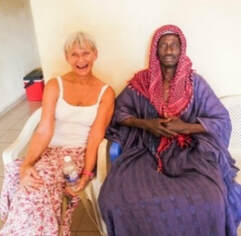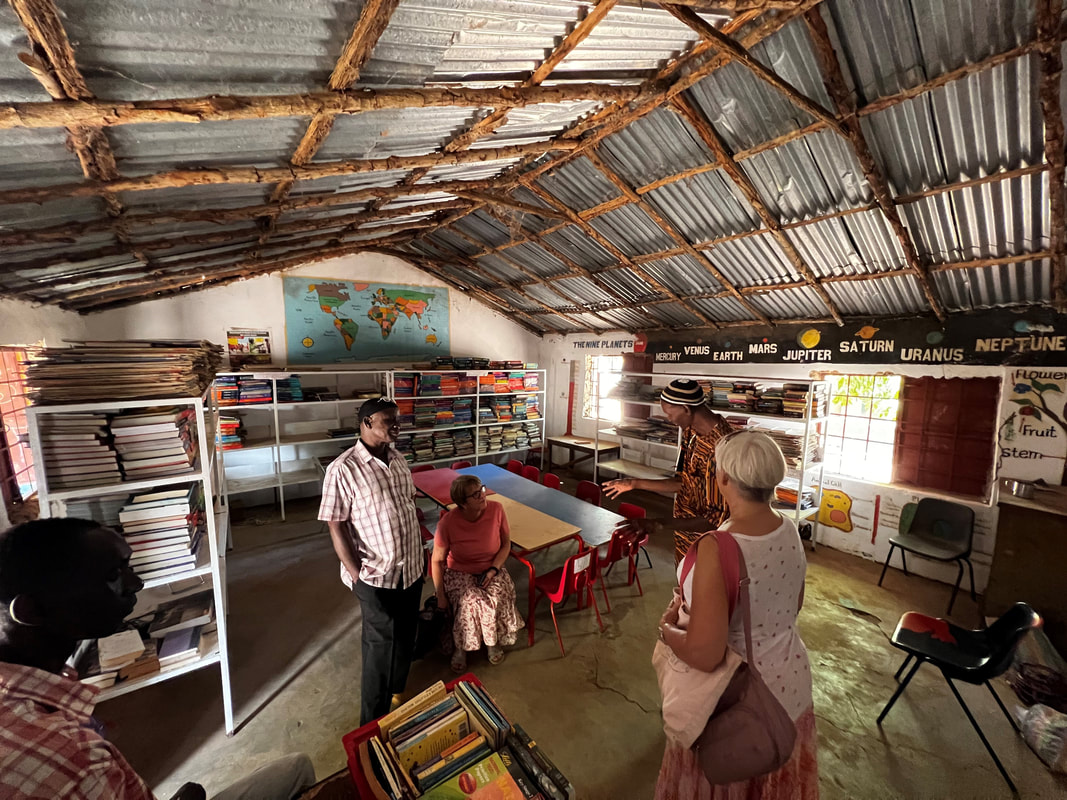 Kira & Marabout Karamo, 2014 Kira & Marabout Karamo, 2014 A highlight of our first trip to the Trust’s projects in February 2014 was visiting the Jappineh Health Centre and meeting the delightful staff. Nearby, there is a health facility of a different kind and Kira, aware of my interest in mental health, has arranged a visit there too. It is owned by the Njie family. The Njie brothers, Karamo and Mdemba, are marabouts - also known as ‘traditional’ doctors. Njie men have treated mentally-ill patients for 350 years. Their healing powers are inherited, and herbs grown on their extensive land are used as remedies for patients. When these are ineffective, the brothers resort to a rigorous, physical approach. Alhaji Karamo, the most renowned brother, greets us enthusiastically. Tall and flamboyant, he sweeps ahead to show us around. Alas, we are permitted to see few patients. Rumours about Njie patients being shackled and whipped are uppermost in my mind and, I’m sure, in Kira’s too. We are then ushered into Karamo’s office. Through the interpreter we brought with us, Kira stresses the efficiency of Western medicine for psychiatric disorders. She has addressed this matter with the brothers many times. Amazingly, Karamo is now accepting that his herbs can’t cure every condition. He is asking for help. As we walk back to the Health Centre, we marvel at this breakthrough. A few days later we visit the only psychiatric hospital in Gambia. Opened in 2009, Tanka Tanka is named after the Dutch Foundation that largely funded it. Anna Bouman, Founder & Vice President, is a friend of Kira’s. There are no psychiatrists in Gambia, but the secondment of a Cuban psychiatrist has been a bonus for Tanka, albeit brief. The buildings encircle a large outside area, where patients are mingling with others or sitting quietly alone. As we amble across to the male wards, a girl slips in beside me and links her fingers through mine. We continue this way until she loses interest and veers off elsewhere. Another patient howls her misery, eventually collapsing into the arms of a kitchen lady. *** Back in England, we soon receive Kira’s ‘Preliminary Ideas’ document for the Trust’s psychiatric programme and we pore over it avidly. It is a thesis! Every possible factor has been thought through. For example, a Jappineh Health Centre nurse will be trained by the Tanka Community Mental Health Team; that team will also visit the Njie facility on a monthly basis, and their transport costs and other allowances will be covered. Kira senses that the Tanka team will relish the opportunity to make an impact at the Njie establishment. We are very happy to fund the beginnings of this pioneering initiative for Gambia’s mental health, including the cost of psychiatric medicine. A month later we hear that Karamo Njie is in prison, having allegedly murdered a patient by caning him to death. If ever there is a time to redress the treatment of mental illness in Gambia, this is it. Kira succeeds in securing the counsel and ongoing guidance of the World Health Organisation (WHO). Their Country Facilitator for the Mental Health Leadership and Advocacy Programme (mhLAP), Dawda Samba, is a huge asset. We are sent the 1st issue of Dawda’s newsletter Drop the Chain and Cane. The title alone is spine-tingling in its intent. This excerpt shows Dawda’s 4 phases. Minutes of the Gambian Management Team meetings include updates on the psychiatric programme and for the most part they convey steady progress. The Tanka Tanka outreach team run ongoing and successful joint training sessions with Health Centre staff and the Njie family. A sticking point, however, is the family’s reluctance to contribute towards the purchase of psychiatric drugs, and to contribute towards the services offered to them by Modou Jobe, the nurse assigned to administer the injections. These entirely reasonable expectations are at last (albeit reluctantly) accepted. The Njie family has seen the effectiveness of the drugs on their patients and has at last consented to contributing their quota, thus securing sustainability.
Shortly before my visit to the projects in January this year, Dawda Samba went to the Njie hospital to ascertain the prevailing situation. His report ends: “Patients are no longer put in chains, caned, or locked in. Their rooms look reasonably neat and clean. There was evidence that a closer collaboration between the HC and the marabouts is being fostered, based on mutual understanding.” African Oyster Trust’s work for the treatment of mental illness in Gambia remains the only collaboration between Western nursing and medicine, and the traditional methods of marabouts. Medical history is being made by a small charity that dares to innovate.
0 Comments
Your comment will be posted after it is approved.
Leave a Reply. |
News DiaryThe News Diary is a regular account of all that is happening at The African Oyster Trust. Please pop back for regular updates, follow us on Twitter or sign up for our RSS feed to have the latest news sent straight to your computer! AuthorsThe news diary is written by a number of people close to the work of the African Oyster Trust, including founder James Holden, his co-directors, trustees and volunteers. Archives
February 2024
Categories
All
|






 RSS Feed
RSS Feed